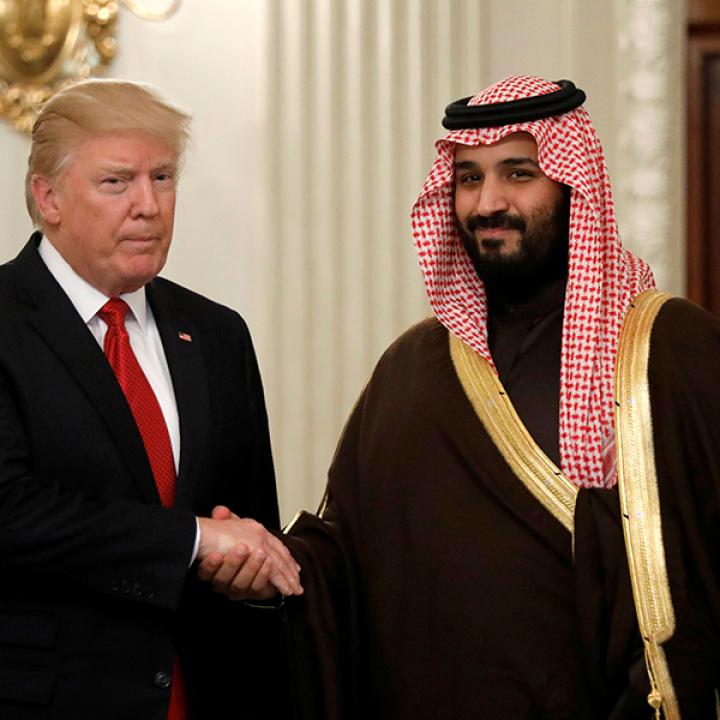
- Policy Analysis
- Articles & Op-Eds
Gulf Leaders: "Welcome Back Donald, It’s Time to Get Down to Business"
Also published in Arabian Gulf Business Insight

Many leaders seem eager for the return of a U.S. administration that has shown a predilection for encouraging big business ties—though the ten weeks before Inauguration Day will be fraught with risks of new or escalated regional crises.
The world is in shock. Former president Donald Trump is about to be president again. After weeks of a tight race not only did he win the electoral college, America’s curious body which formally chooses the next leader, but his Republican party picked up seats in the Senate and is on track to control the House of Representatives as well. Perhaps most crucially in domestic political optics, he has won the popular vote by a convincing margin.
How did he do it? Disappointment in President Biden’s economy is emerging as perhaps the most significant reason. People were fed up with rising prices and saw no respite under a future leadership of Kamala Harris.
Trump played on that, though he doesn’t really have a clear economic policy of his own. But he has promised tax cuts. He also wants tariffs on imports to the US. China is a principal target, though the idea would by itself mean price increases.
Trump’s victory speech early on Wednesday morning did not give any hints. Unscripted, as usual, the only economic angle was a curious reference to oil: “We have more liquid gold than any country in the world. More than Saudi Arabia, we have more than Russia.”
He may just have been recalling the 2020 production race between Moscow and Riyadh, which briefly saw prices fall to zero until Trump’s own tough talking with Vladimir Putin and Saudi Crown Prince Mohammad bin Salman re-established market stability. Is Trump going to continue to see Opec as the way of the future or revive the notion of a Nopec, which would be better for the US?
The Arab Gulf should be looking forward to a reinvigoration of the strong business ties that existed between Washington and the Gulf Cooperation Council during the first Trump administration 2017-2021. In September this year both Emir Tamim of Qatar and President Mohammad bin Zayed of the UAE visited Trump in Mar-a-Lago, his Florida base, within a few days of each other. And yesterday Bin Salman phoned Trump to offer his congratulations on his victory.
Despite apparently good working relations now, Washington and Riyadh have never seemed to recover properly from Biden describing MbS, as the Saudi crown prince is known, as a “pariah.” This was because of the prince’s alleged-but-denied involvement in the killing of Washington-based Saudi journalist Jamal Khashoggi in 2018.
The diplomatic rift between Qatar on one side, and Saudi Arabia, the UAE and others on the other was a barrier to cooperation during the first Trump administration. But now Trump’s former treasury secretary Steve Mnuchin does business with all three countries, and Trump’s son-in-law Jared Kushner runs an investment fund boosted by a $2 billion injection from the Saudi crown prince, with additional amounts in the hundreds of millions of dollars from the UAE and Qatar.
We now face the enforced interlude of 10 weeks between polling day and the inauguration of the next president. This is intended to give the incoming administration enough time to decide on personnel.
But these days it also means that Middle East roles in Washington may be unstaffed. Biden appointees and loyalists will be exiting to look for new jobs and take unused leave. At a time of crises in Gaza, Lebanon and potentially Iran, the US is effectively rudderless.
Trump has already clearly indicated that he wants to end the Ukraine war, even if it means Kyiv having to make painful concessions to Moscow. Binyamin Netanyahu in Israel will be trying to improve his country’s strategic position and his own standing, and will be ruthless about doing so. Iran will be reassessing its judgments on Trump’s political thinking, which is likely to remain wary of intervention.
The nightmare scenario is that a new or escalated Middle East crisis will erupt in the next few weeks. Trump will be powerless, and Biden/Harris will be weak and likely to be cautious on how to respond. But if we can get through to late January, there will be an emerging new administration with a predilection for encouraging business, and displaying a diplomatic strength that could deter opponents.
Simon Henderson is the Baker Senior Fellow at The Washington Institute and director of its Bernstein Program on Gulf and Energy Policy. This article was originally published on the AGBI website.



